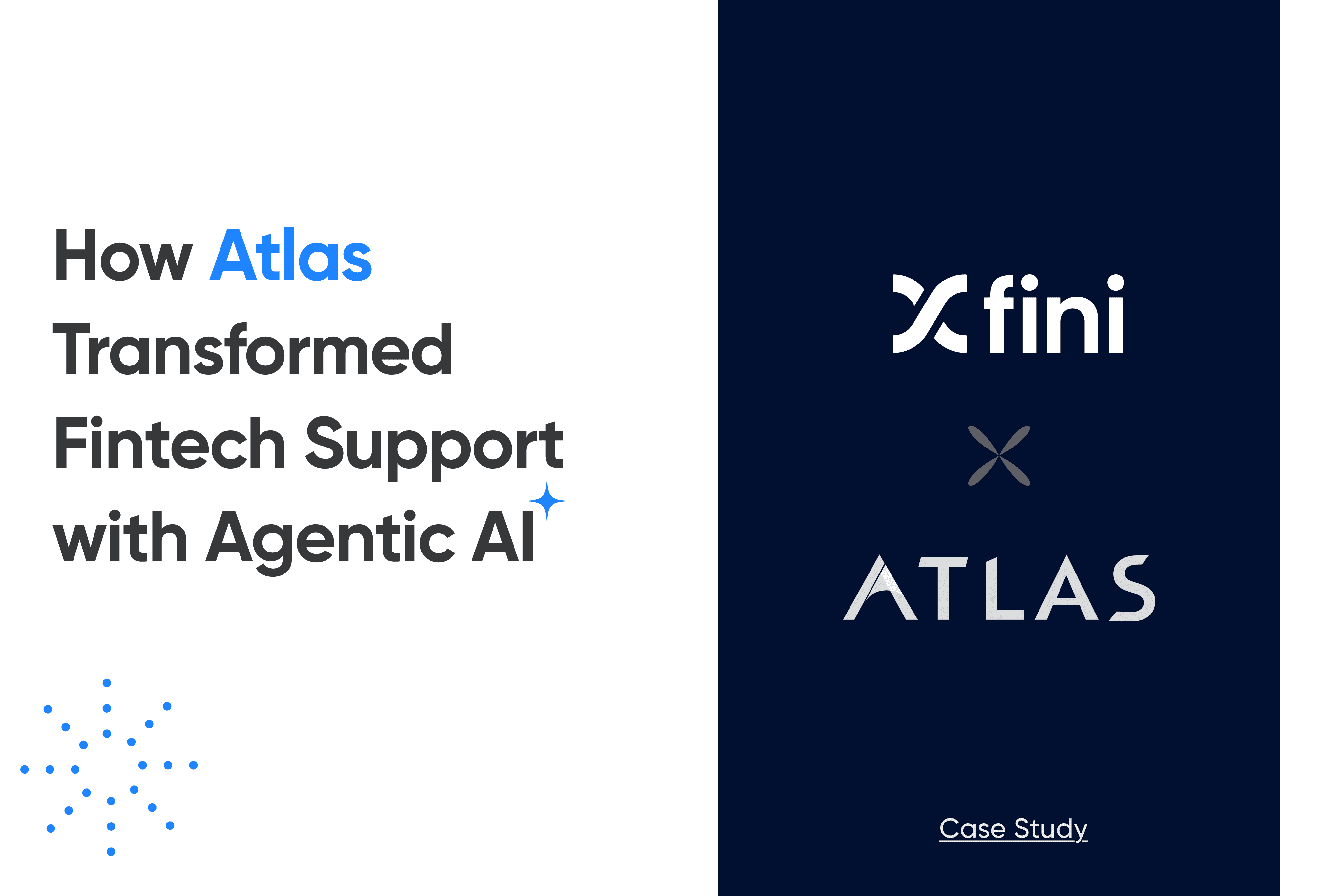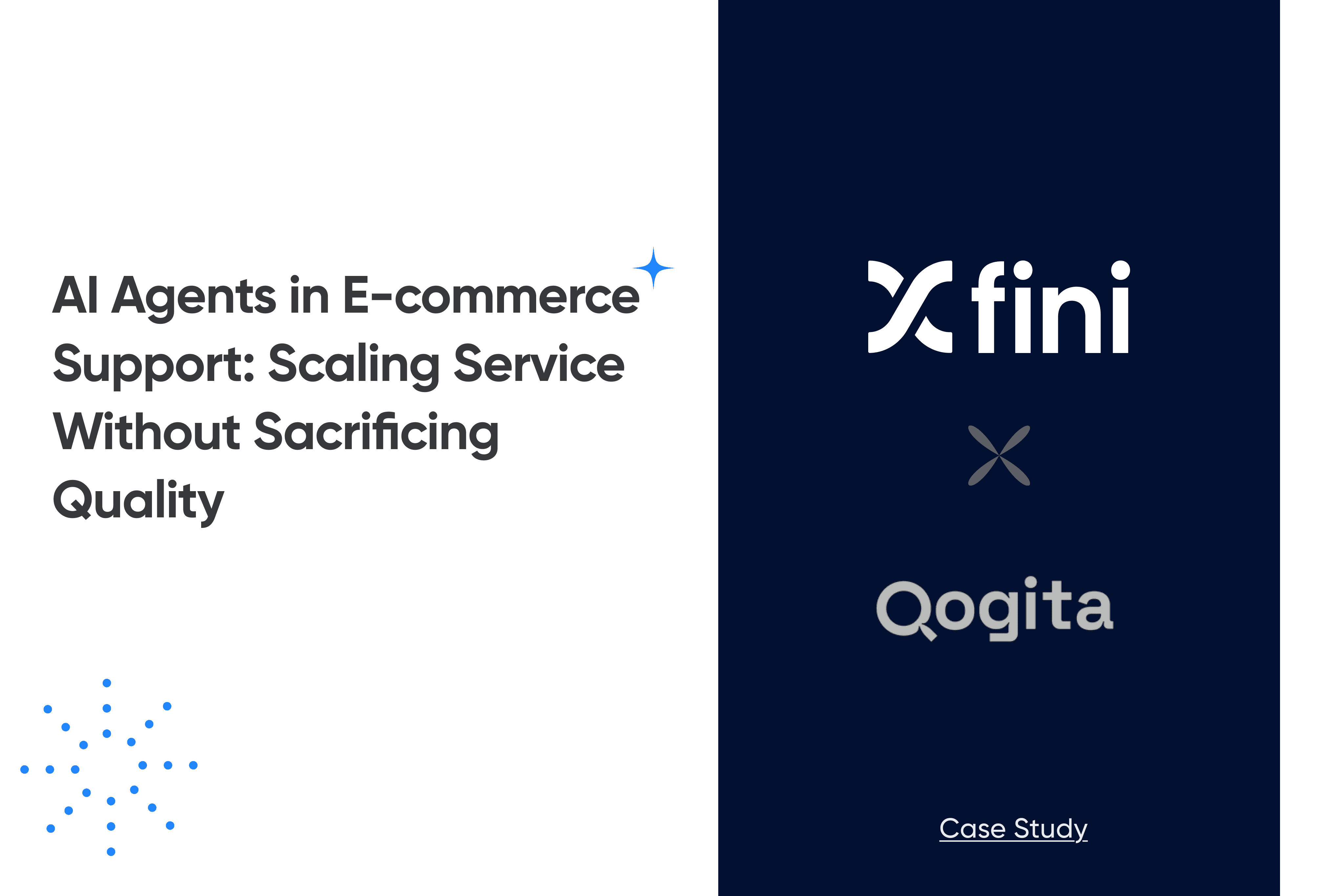Case Studies
Feb 17, 2025

Deepak Singla

IN this article
Who is DistroKid? DistroKid, a leading digital music distribution service, faced the challenge of managing an increasingly complex array of customer queries. Handling over 30,000 queries per month originating from 2 million+ registered artists across a diverse range of platforms, they needed a solution to streamline operations without compromising on accuracy or customer satisfaction. Learn how DistroKid transformed its customer support operations with the help of Fini AI, achieving remarkable results.
Let us take a glance at what DistroKid has to say

The Unique Journey
DistroKid’s business model is unlike many e-commerce solutions; they empower artists who upload proprietary content across all major music platforms (Spotify, Apple Music, etc) and collect royalties. Three key challenges made managing and scaling customer support difficult:

Extremely specific/ complex questions: Customer escalations were highly specific and complex, requiring detailed knowledge of content types, streaming platforms, and royalties structures. For example, artists often had issues unique to certain platforms, like Spotify's specific metadata requirements or Apple’s upload limitations. Addressing these queries accurately required a deep understanding of multiple platforms' nuances. To answer, human agents would need to build a wide ranging context and an understanding of how those issues inter-relate, leading to long call times.
The extreme long tail: The team handled 500+ ticket categories, driven by diverse content types, listing platforms, payment structures, artist collaborations, and geographic laws. The long tail of categories is often described internally within the DistroKid support team as "artists can and will write in about absolutely everything". The complexity of each user request is effectively limitless as each user can have problems with multiple DistroKid products, multiple platform requirements, billing, earnings, and more... all in the same ticket.
Accuracy: As an earning-enabling platform, it was crucial for DistroKid to provide highly accurate guidance in the very first attempt to maintain brand trust. Any misinformation could potentially lead to financial loss for artists or legal complications, making precision paramount.
To address these challenges, DistroKid partnered with Fini AI to develop a tailored AI-powered customer support solution.

From the start, we were in intense collaboration with DistroKid to understand their needs. It became clear that DistroKid needed three new custom features built:
Large-Scale Categorization: DistroKid's support team faced an overwhelming volume of complex queries across multiple music platforms. The manual categorization process was inefficient, causing delays and inconsistent responses. Fini implemented an ML categorization model that learned from past data, achieving 99% accurate categorization from day one. This prevented a pressing pain-point of mis-labeling that caused customer frustration as they’d need to speak to multiple agents, leading to longer TAT. They would also need to spend valuable agent hours re-assigning those requests. The model now excels in distinguishing nuanced categories, such as metadata errors versus platform-specific upload failures, creating immediate impact. It is also continuously improving and becoming more specific as knowledge and instruction are updated.

Continuous Learning Feedback Loop: When dealing with diverse categories and constantly evolving rules from listing platforms, a continuous learning process was crucial. We addressed this with our robust Feedback Loop.If the trained AI agent encountered updated rules it didn't know, it would escalate the query to a human agent, who would provide the updated data source. This information was quickly integrated into the backend, allowing the AI to self-resolve similar issues in the future. If a query was not in the Fini knowledge base, it was flagged for human review and used for AI retraining. Utilizing Fini’s Feedback Loop, the AI agent rapidly incorporated new information, ensuring accurate handling of new queries. This dynamic feedback loop continuously enhanced the AI's capabilities.

Agentic Flows: As it goes in Animal Farm - “all animals are equal, but some animals are more equal”. Similarly, while all categories are important, some are more sensitive. Our goal was 100% accuracy for these critical categories. We developed a feature called ‘Flows’ for specific queries requiring sensitive handling. By integrating business-driven logic with AI, we reduced unpredictability and ensured precise actions. This enabled DistroKid to handle sensitive topics, such as unfulfilled payment withdrawal requests or time sensitive metadata edit requests with increased speed and accuracy. These high-stakes issues were routed through predefined process flows, collecting necessary inputs from the users and then routing them through set personalized channels, ensuring they were managed with the utmost care and precision instead of blurting same static answers.

Cherry on top was that we were able to automate a whole bunch of very niche use-cases. For instance DistroKid had an issue where artists would request withdrawal and it got messy owing to different platform policies and each artist’s different minimum withdrawal thresholds. With Fini we were able to construct designated flows and get users to resolution in milliseconds now (pfb example).

Controlled Launch: Fini and DistroKid executed a controlled launch over the top 10 categories first, ensuring a smooth transition and sustained customer satisfaction. The AI manager maintained a rigorous accuracy check and worked closely with DistroKid’s CX leaders for continuous improvement. This phased approach allowed for real-time adjustments and ensured the AI system met DistroKid's high standards.
Within a span of 3 months, we saw astonishing results.
We went from 0% to 99% automation in accurate query categorization
We were able to reduce 5-10% monthly support cost driven by AI automation. We are on track to save north of 30% support costs by the end of the year.
Conclusion: DistroKid's partnership with Fini AI highlights the transformative power of AI in customer support. By automating half of their query handling and achieving near-perfect categorization accuracy, DistroKid streamlined operations, reduced response times, and enhanced customer satisfaction.
Learn how Fini AI can revolutionize your customer support operations. Visit https://www.usefini.com/ to discover more!
Deployment Challenges & Strategy
1. Why did DistroKid need an AI-powered support solution?
DistroKid was handling over 30,000 monthly queries from 2 million+ artists. Their support team struggled with complex, long-tail queries that required platform-specific knowledge, fast resolution, and high accuracy—making traditional support models inefficient and unsustainable.
2. What were the biggest support challenges DistroKid faced?
They struggled with:
Complex, platform-specific queries
Over 500+ ticket categories (long-tail issues)
The need for high accuracy due to financial implications for artists
3. How did Fini approach DistroKid's support problems?
Fini worked closely with DistroKid to identify pain points and co-develop custom features—automated categorization, agentic flows, and a feedback loop—to ensure the AI adapted to evolving support needs.
4. Why wasn’t an off-the-shelf chatbot enough for DistroKid?
Generic bots lacked the nuance to handle DistroKid’s intricate issues like royalty calculations, metadata errors, and platform-specific policies. A deeply customized AI was required for precision and scale.
5. How long did it take to see results post-deployment?
Within just 3 months, Fini helped DistroKid automate 99% of ticket categorization and began driving measurable cost savings and customer satisfaction improvements.
AI Categorization & Automation
6. What is Fini’s ML-based categorization model?
It’s an AI model trained on historical DistroKid tickets to predict the correct category with 99% accuracy, dramatically reducing misrouting and manual agent intervention.
7. Why was accurate categorization so important for DistroKid?
Because misrouted tickets led to artists waiting longer, unnecessary escalations, and wasted agent time re-assigning queries—all hurting satisfaction and cost-efficiency.
8. How many categories did the AI handle from day one?
Fini launched with automated categorization for DistroKid’s top 10 categories and expanded from there using a phased rollout.
9. Did Fini’s categorization work for long-tail edge cases?
Yes, over time, the AI was trained to identify increasingly niche categories (e.g., “SoundCloud monetization metadata errors”) with the help of the feedback loop.
10. How did the AI adapt to new categories?
New or evolving categories flagged by the AI were reviewed by human agents, retrained, and rapidly added to the model for future resolution.
Feedback Loop & Continuous Learning
11. What is the continuous learning feedback loop?
It’s a system where unresolved or escalated tickets are reviewed, corrected by agents, and automatically used to retrain the AI, allowing it to learn from new edge cases.
12. How fast is the AI updated with new knowledge?
In many cases, updates happen within hours to days. Fini ensures AI learns from new ticket resolutions, product updates, or policy changes nearly in real-time.
13. What kind of tickets are flagged for review?
Tickets with uncertain confidence, unseen content, or poor AI outcomes are routed to human agents, reviewed, and then added to the training data.
14. How did this loop reduce human workload over time?
By continually incorporating new patterns, the AI needed less manual input for recurring cases—allowing humans to focus only on genuinely novel queries.
15. Can the feedback loop handle policy changes from platforms like Apple Music or Spotify?
Yes, when agents resolve new scenarios or platform updates, they train the AI to recognize and resolve them going forward.
Agentic Flows for High-Stakes Queries
16. What are ‘Agentic Flows’ in Fini?
These are structured workflows built into the AI for handling sensitive or complex scenarios (e.g., delayed payments, urgent metadata edits) with 100% precision.
17. Why are Agentic Flows better than static replies?
They collect user inputs dynamically, apply business rules, and route queries intelligently—ensuring sensitive issues are solved correctly the first time.
18. How did DistroKid use Agentic Flows?
Flows were used for scenarios like royalty disputes, delayed withdrawals, and urgent content take-downs—where accuracy and tone were critical.
19. Can Agentic Flows integrate with support policies?
Yes, they follow decision trees built on business logic and automatically pull relevant information from internal systems or past cases.
20. How do Flows impact agent productivity?
They eliminate back-and-forth and resolution delays, freeing up agents to focus on unique or escalated situations only.
Use Case Highlights
21. What’s an example of a unique DistroKid use case automated by Fini?
Fini automated artist withdrawal requests with dynamic thresholds per artist/platform—a previously manual, error-prone workflow.
22. How did Fini handle complex metadata issues?
Fini’s AI identified platform-specific metadata errors (e.g., Spotify vs Apple rules) and generated correct, contextual responses for each.
23. Could Fini deal with multi-layered issues in one ticket?
Yes, its NLP engine processed multiple subtopics (e.g., billing + metadata + royalties) within a single message and addressed each appropriately.
24. How does Fini handle legal or earnings-related support?
By incorporating sensitive topic detection and routing them to pre-approved flows or trained agents for careful resolution.
25. Did Fini help with artist collaborations and royalty splits?
Yes, the AI learned to resolve edge cases like co-creator payment errors or territory-specific disputes over earnings splits.
Performance Metrics
26. What was the automation rate for categorization?
Fini reached 99% accuracy in ticket categorization within three months of deployment.
27. How much did AI automation reduce support costs?
Initial savings were 5-10% of monthly support spend, with projections to exceed 30% by year-end.
28. Did resolution time improve?
Yes, average ticket resolution time dropped significantly as the AI took over bulk queries and improved triage.
29. Was there any negative impact on CSAT?
No—CSAT actually improved, as users received faster, more accurate, and contextual responses.
30. How did DistroKid measure success post-launch?
Key metrics tracked included automation rate, categorization accuracy, resolution speed, CSAT, and agent productivity.
Collaboration & Launch Process
31. How involved was DistroKid during development?
Highly involved—Fini collaborated directly with DistroKid’s CX and product teams to understand workflows and train the AI.
32. What was the rollout strategy?
Fini started with the top 10 categories and gradually expanded through controlled testing, feedback, and refinement.
33. How were human agents integrated into the process?
They played a key role in training, validating escalations, and identifying flows—creating a human-AI symbiosis.
34. Was agent training required to use the AI?
Minimal training was needed—agents mostly reviewed AI suggestions or contributed to flow design and knowledge refinement.
35. What’s the ongoing support structure post-launch?
Fini provides ongoing model monitoring, retraining, and feature updates in collaboration with DistroKid’s internal team.
Broader Implications
36. Can other companies replicate this approach?
Yes—Fini’s platform is designed to be customizable for other long-tail or sensitive use cases in industries like fintech, edtech, and SaaS.
37. Does this mean fewer agents are needed?
Not necessarily—agents are reallocated to higher-order tasks, escalation handling, and complex investigations, improving both efficiency and morale.
38. How does this impact long-term CX strategy?
AI enables brands to scale personalized support, reduce churn, and handle growth without needing to triple headcount.
39. What’s the risk of over-automating?
Over-automation can lead to impersonal or incorrect responses, which is why Fini includes guardrails, flows, and human fallback for balance.
40. Where can I learn more about Fini’s solutions?
You can explore Fini's capabilities, case studies, and demo requests at https://www.usefini.com.
More in
Case Studies
Co-founder
























